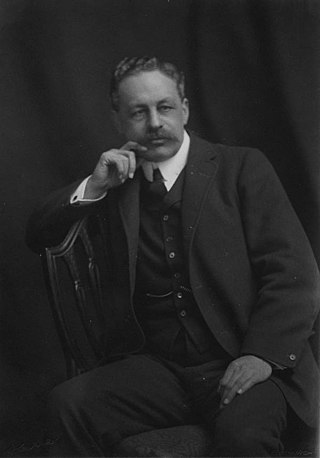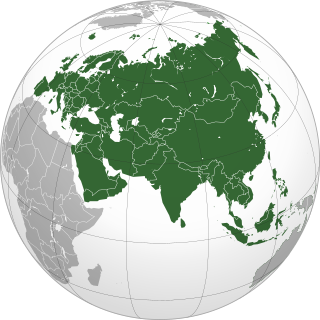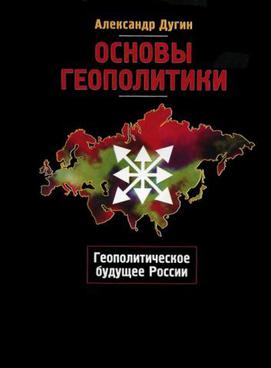Related Research Articles
Geopolitics is the study of the effects of Earth's geography on politics and international relations. While geopolitics usually refers to countries and relations between them, it may also focus on two other kinds of states: de facto independent states with limited international recognition and relations between sub-national geopolitical entities, such as the federated states that make up a federation, confederation, or a quasi-federal system.

The Eurasia Party is a National Bolshevik Russian political party. It was registered by the Ministry of Justice on 21 June 2002, approximately one year after the pan-Russian Eurasia Movement was established by Aleksandr Dugin.

Sir Halford John Mackinder was an English geographer, academic and politician, who is regarded as one of the founding fathers of both geopolitics and geostrategy. He was the first Principal of University Extension College, Reading from 1892 to 1903, and Director of the London School of Economics from 1903 to 1908. While continuing his academic career part-time, he was also the Conservative and Unionist Member of Parliament for Glasgow Camlachie from 1910 to 1922. From 1923, he was Professor of Geography at the London School of Economics.

Aleksandr Gelyevich Dugin is a Russian far-right political philosopher.
Geostrategy, a subfield of geopolitics, is a type of foreign policy guided principally by geographical factors as they inform, constrain, or affect political and military planning. As with all strategies, geostrategy is concerned with matching means to ends Strategy is as intertwined with geography as geography is with nationhood, or as Colin S. Gray and Geoffrey Sloan state it, "[geography is] the mother of strategy."

Robert David Kaplan is an American author. His books are on politics, primarily foreign affairs, and travel. His work over three decades has appeared in The Atlantic, The Washington Post, The New York Times, The New Republic, The National Interest, Foreign Affairs and The Wall Street Journal, among other newspapers and publications.

The Rimland is a concept championed in the early 20th century by Nicholas John Spykman, professor of international relations at Yale University. To him, geopolitics is the planning of the security policy of a country in terms of its geographical factors. He described the maritime fringe of a country or continent; in particular the densely populated western, southern, and eastern edges of the Eurasian continent.
In the humanities discipline of critical theory, critical geopolitics is an academic school of thought centered on the idea that intellectuals of statecraft construct ideas about places, that these ideas have influence and reinforce their political behaviors and policy choices, and that these ideas affect how people process their own notions of places and politics.
Eurasianism is a socio-political movement in Russia that emerged in the early 20th century which states that Russia does not belong in the "European" or "Asian" categories but instead to the geopolitical concept of Eurasia governed by the "Russian world", forming an ostensibly standalone Russian civilization. Historically, the Russian Empire was Euro-centric and generally considered a European/Western power.
The Intermediate Region is an established geopolitical model set forth in the 1970s by the Greek historian Dimitri Kitsikis, professor at the University of Ottawa in Canada. According to this model, the Eurasian continent is composed of three regions; in addition to Western Europe and the Far East, a third region called the "Intermediate Region" found between the two constitutes a distinct civilization. It roughly covers Eastern Europe and the Middle East and North Africa (MENA).

Afro-Eurasia is a landmass comprising the continents of Africa, Asia, and Europe. The terms are compound words of the names of its constituent parts. Afro-Eurasia has also been called the "Old World", in contrast to the "New World" of the Americas.

Eurasia is the largest continental area on Earth, comprising all of Europe and Asia. According to some geographers, physiographically, Eurasia is a single continent. The concepts of Europe and Asia as distinct continents date back to antiquity, but their borders have historically been subject to change, for example to the ancient Greeks Asia originally included Africa but they classified Europe as separate land. Eurasia is connected to Africa at the Suez Canal, and the two are sometimes combined to describe the largest contiguous landmass on Earth, Afro-Eurasia.

Marc d'Anna, writing under the pen name Alexandre del Valle, is a Franco-Italian geopolitologist, writer, professor, columnist, and political commentator.
Limes is a monthly Italian geopolitical magazine published in Rome, Italy.

The Foundations of Geopolitics: The Geopolitical Future of Russia is a geopolitical book by Aleksandr Dugin. Its publication in 1997 was well received in Russia; it has had significant influence within the Russian military, police, and foreign policy elites, and has been used as a textbook in the Academy of the General Staff of the Russian military. Powerful Russian political figures subsequently took an interest in Dugin, a Russian political analyst who espouses an ultranationalist and neo-fascist ideology based on his idea of neo-Eurasianism, who has developed a close relationship with Russia's Academy of the General Staff.

Zaur Shiriyev is an Azerbaijani academic in the field of international affairs. He is an Academy Associate at the Royal Institute of International Affairs in London. He was a senior research fellow at ADA University, Baku, where he worked between May 2014 and March 2017. Prior to joining ADA University, he worked as leading research fellow at the Center for Strategic Studies under the President of the Republic of Azerbaijan (2009–14). He founded and has served as Editor-in-Chief of the first English-language academic journal in Azerbaijan, “Caucasus International”, in 2011. Caucasus International was the first English-language foreign policy journal to which academics from all three of the South Caucasus countries contributed. It is rare if not unique for a dispassionate academic journal to be created by and for the main parties to one of the world’s “frozen conflict zones,” which is what the Caucasus certainly is.
Dashdorj Bayarkhuu is a Mongolian research professor, columnist and writer and former ambassador of Mongolia to Egypt. Prior to his nomination to the ambassadorial position, Bayarkhuu worked in media, defense, diplomatic and educational sectors. After his tenure as ambassador in Cairo, Bayarkhuu returned to academic field as a Visiting Professor of International Politics and Contracted Researcher. He joined the Ministry of Foreign Affairs of Mongolia as Deputy Director, Policy Planning & Co-ordination Department in 2015–2016.

Leszek Sykulski is a Polish political scientist specializing in geopolitics.

Ruben Karapetyan is an Armenian diplomat, historian, author, Ambassador, Doctor of Historical Sciences, Professor.
Geopolitical economy is a contemporary Marxist approach to understanding the capitalist world historically. It was proposed by Radhika Desai in her Geopolitical Economy: After US Hegemony, Globalization and Empire as a critique of contemporary mainstream theories of International Political Economy (IPE) and International Relations (IR). Geopolitical economy's critique rests on a rejection of orthodox views of the world economy as a seamless whole, united either by markets or by a single leading state, as in free market, free trade "globalization" and "hegemony" theories respectively. Instead, geopolitical economy emphasizes the interplay of political entities, namely, states, in the development of capitalism by going back to classical political economy and to the Marxist theories of imperialism, which geopolitical economy argues should be considered the first theories of international relations.
References
- ↑ Tiberio Graziani is now the current editor in chief of the geopolitical magazine Geopolitica Archived 5 November 2012 at the Wayback Machine
- ↑ "Eurasia: Presentation". Archived from the original on 30 January 2010. Retrieved 3 February 2010.
- ↑ Former leader of the Italian section of Jean Thiriart's Jeune Europe and member of the "nazi-maoist" group Lotta di Popolo (Pulsioni antimondialiste e vecchio antisemitismo, Gnosis n. 4/2005), Claudio Mutti is also founder of Edizioni all'Insegna del Veltro, which published, among others, books by Robert Faurisson, Julius Evola, Corneliu Codreanu, Savitri Devi and Johann von Leers
- ↑ "Giovanni Armillotta on line". www.giovanniarmillotta.it. Retrieved 4 November 2021.
- ↑ http://www.statopotenza.eu/gerenza. Lorenzo Salimbeni is its editor-in-chief
- ↑ Claudio Moffa is known for his invitation to Robert Faurisson to lecture in his university
- ↑ In brackets is indicated the numbering of the volumes published by the founding of the magazine